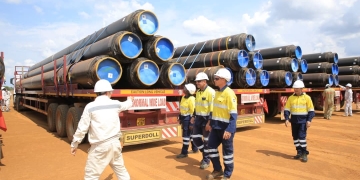
KAMPALA —The Deputy Speaker of Parliament, Thomas Tayebwa has lambasted the European Union Parliament for poking its nose into the development of the oil and gas sector in Uganda and Tanzania, following passing of a motion asking the two countries to halt the construction of oil pipeline.
Tayebwa, who did not have kind words for the EU Parliament as he opened Thursday afternoon’s plenary sitting, described as “economic racism” the move to block the construction of the East African Crude Oil Pipeline (EACOP).
He condemned the resolution saying the idea behind it is an act of neo-colonialism by the Europeans thinking that they can control the economic affairs of independent African countries.
“The resolution is based on misinformation and deliberate misrepresentation of key facts on environment and human rights protection. It represents the highest level of neo-colonialism and imperialism against the sovereignty of Uganda and Tanzania” Tayebwa charged.
He added that; “like many African countries, Uganda is a developing country, and a sovereign state that has its unique development needs and priorities. I therefore call upon the European Union Parliament to withdraw the motion for a resolution against a UN Charter that provides for Uganda’s right to self-determination and sovereignty over its natural resources”.
The movers of the motion during the sitting in Belgian capital, Brussels on Wednesday pointed to human rights violations in Uganda and Tanzania. The motion was also seeking to exert Pressure on Emmanuel Macron the French President and his government to stop Total Energies SE from developing the Sh14 trillion pipeline. Total Energies SE, a giant oil and gas multinational, represents the interests of the French government.
Total Energies EP as a subsidiary of the French giant is developing oil fields in Nwoya and Buliisa Districts while another subsidiary; Total Holdings International B.V holds 62 percent share in the EACOP holding company.
Supposed to snake through several districts of Uganda and Tanzania, the EACOP measuring 1,443k will transport crude oil from Kabaale in Hoima District to the Chongoleani Peninsula near Tanga port. It is here that the crude oil will be shipped for refining abroad.
However, environmental activists in Europe have openly demonstrated against the pipeline, hence the move by members of the EU Parliament who secured a resolution on Wednesday.
The movers and supporters of the motion want the development of the pipeline to be halted for at least one year for the stakeholders to chart a new route that is environmentally friendly.
They also hinted at information that the project affected persons (PAPs) have been disposed of their land. They accused the designers of the EACOP of not considering the issues of carbon emissions and human rights violations.
In his response, the Deputy Speaker has been speaking tough against the white environmental activists, asking the western countries to first stop the oil production projects of their own before giving directions on what is happening in Uganda.
He said that the motion by the EU Parliament is intended to curtail the development of the Oil and Gas sector in Uganda hence denying the Ugandans and the entire East African region the benefits and opportunities from the extraction of oil.
“Various member states in the EU continue exploring, developing and have increased production and use of fossil fuels in recent months. There are over 9000 oil and gas production licenses in the USA, including plans to drill in Alaska and the Arctic sea. Fifty three licenses have recently been issued in the North Sea and Germany has revived its coal plants” Tayebwa added.
He wondered whether energy security is only a preserve of the western countries so that the EU Parliament can prevail over Uganda’s quest to exploit its oil and gas.
The Deputy Speaker also responded to the allegations that the PAPs have not been compensated and rebuffed the lie saying over 70 percent of those whose land has been acquired have received their pay or have been resettled.
Tayebwa, who is also the Ruhinda North legislator, reminded the Europeans of the value associated with oil and gas discovery that includes employment, provision of services and goods, technical skills and significant revenues for the country.
Uganda boasts of approximately 6.5 billion barrels of oil reserves that were discovered in the Albertine area with more potential reserves expected to be discovered with subsequent explorations. At least 1.4 billion barrels are estimated to be recoverable from the underground rocks.

















